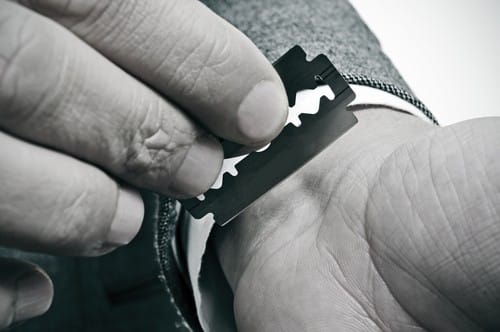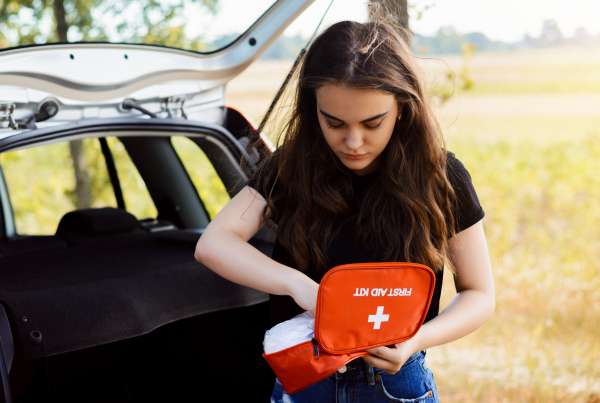Cutting is a form of self-injury or SI.
Contrary to how it might seem to someone on the outside looking in, cutting is not a way to get attention. It is not a suicide attempt.
While cutting is not the same as attempting to attempt suicide, individuals who self-injure are at a higher risk of attempting suicide and should be assessed for suicidality. Cutting is a sign that the person is in deep emotional pain and that pain must be addressed before the self-injuring behavior can stop.
If you suspect your child is self-injuring, there are some basic facts about this behavior that you need to know.
What does Cutting Look Like?
Cutting can be done with any sharp object found around the house, such as razors, thumbtacks, scissors, or even the edge of a soda can pop top.
The cuts usually occur on the arms, but some teens also cut on the thighs or abdomen. Most cuts are straight lines, although some teens might also cut words into skin to reflect their deep feelings, leading to their self-injury.
Cutting is the most common form of self-injury among young people, but other forms, such as burning or scratching, also exist.
Common symptoms of cutting might include:
- Fresh cuts or scratches
- Scars along the arms or other areas
- Sharp objects in the trash or hidden in the teen’s bedroom
- Wearing long sleeves even on hot days
- Spending more extended periods of time alone
- Feelings of helplessness or hopelessness
- Other disorders, such as an eating disorder or substance abuse
- Extreme mood shifts or out-of-control behavior
Self-injury can begin as early as middle school and is common among teenagers, so parents and caregivers should be vigilant for these symptoms.
Hiding the Pain
Kids who cut may find some emotional relief from the behavior, but they also know it is not “right” or “normal” to others.
They will make every effort to hide their cutting, wearing clothing that covers up the injuries and scars, or lying about how the injuries occurred. Parents often feel
Cutting is a form of self-injury or SI. Contrary to how it might seem to someone on the outside looking in, cutting is not a way to get attention. It is not a suicide attempt. While cutting is not the same as attempting to attempt suicide, individuals who self-injure are at a higher risk of attempting suicide and should be assessed for suicidality. Cutting is a sign that the person is in deep emotional pain and that pain must be addressed before the self-injuring behavior can stop.
If you suspect your child is self-injuring, there are some basic facts about this behavior that you need to know.
The Pain Principle
If cutting is not done to get attention, why do kids do it?
In most cases, kids begin cutting because they are experiencing deep emotional pain, from an event like a death, previous abuse, or intense stress or anxiety. The cutting actually relieves the emotional pain, almost like drugs or alcohol numb the senses. The act of cutting is often a way to cope with overwhelming feelings and emotional distress.
Teens who cut are not looking to end their lives from this behavior. However, there are cases where the cutting goes deeper than the person intended, requiring stitches or even hospitalization. In some cases, self-injury can become life-threatening and requires immediate intervention. Kids who cut are also suffering deep emotional issues that could lead to suicidal thoughts and ideations in the future if the issues are not addressed.
Cutting is a serious problem that can become almost addictive over time. The behavior is often associated with food addictions or substance use disorders.
If your teen is cutting, help is available. Contact Visions Adolescent Treatment Centers today at 866-889-3665 to learn more about cutting or get the help your child needs.
The Impact of Cutting on Mental Health
Mental health is a crucial component of our overall well-being, particularly during adolescence, when young people are navigating significant changes and challenges.
Adolescent mental health issues such as anxiety, depression, and post-traumatic stress disorder can impact anyone, regardless of background. Recognizing the warning signs of mental health conditions, like sudden changes in behavior, persistent sadness, or withdrawal from activities, is essential for early intervention.
A mental health professional can help individuals and families understand these signs and provide guidance on healthy ways to cope with emotional distress. By seeking support from a mental health provider, parents can help their children manage difficult emotions, reduce the risk of mental illness, and promote positive mental health.
Addressing mental health issues early can prevent more serious problems, including suicidal behavior, and support young people in developing resilience and healthy coping strategies.
Understanding Cutting and Self-Harm
Cutting and self-harm are forms of self-injury where individuals intentionally hurt themselves as a way to manage overwhelming or painful emotions.
This behavior is a common form of self-abuse among young people who may be struggling with anxiety, depression, or the aftermath of trauma. Self-injury can take many forms, including cutting, carving words or symbols into the skin, inserting objects under the skin, or head banging. While these actions are not typically a suicide attempt, they are a sign that the person is in significant emotional pain and needs help.
People who self-injure often describe a brief sense of relief from their emotional distress, but the underlying issues remain. It’s important to understand that self-harm is not just a phase or a way to get attention—it’s a serious mental health concern that requires support from a mental health professional.
If left unaddressed, self-harming behaviors can increase the risk of accidental injury or future attempts to suicide.
Recognizing Signs of Self-Injury
Recognizing the signs of self-injury is vital for parents, teachers, and friends who want to support someone in need.
Physical signs may include fresh cuts, scratches, bruises, or burns. Individuals may also wear long sleeves or long pants, even in hot weather, to conceal injuries. Emotional and behavioral signs may include withdrawal from family members and friends, sudden changes in mood or behavior, and difficulty managing emotions. If you notice these signs of self-injury in your child or a friend, it’s important to talk to a trusted adult or mental health professional.
Encouraging open conversations and seeking help can prevent accidental injury and help young people find healthy ways to cope with difficult emotions. Remember, early intervention can make a significant difference in a young person’s life.
Identifying Red Flags and Other Forms of Self-Harm
Self-harm is not limited to cutting; it can include a range of behaviors such as eating disorders, substance abuse, self-mutilation, skin cutting, and inserting objects into the body.
Red flags that may indicate self-injuring include drastic changes in behavior, withdrawal from social activities, and difficulty managing emotions. Suicidal thoughts or talk about self-harm should always be taken seriously.
If you notice these red flags or suspect other forms of self-harm, it’s crucial to seek help from a mental health professional. Evidence-based treatments like cognitive behavior therapy (CBT) and dialectical behavior therapy (DBT) can be highly effective in helping young people develop healthier coping mechanisms and address the underlying causes of self-injury.
By staying alert to these warning signs and seeking professional support, families can help their loved ones find safer, healthier ways to manage emotional pain.
Crisis Intervention and Immediate Support
When someone is in crisis or actively engaging in self-injury, immediate support is essential. If you or someone you know is in danger, call the crisis lifeline by dialing or texting 988, or reach out to the crisis text line by texting HOME to 741741.
These services connect you with a crisis counselor who can provide support, guidance, and resources at any time of day. In addition to crisis intervention, ongoing support from a mental health professional is vital for addressing underlying mental health conditions and preventing suicidal behavior.
Organizations like the National Alliance on Mental Illness (NAMI) offer resources and support for individuals and families affected by mental illness. By acting quickly and seeking help, you can make a life-saving difference for someone struggling with self-injury or suicidal thoughts.
Remember, you are not alone – help is available, and recovery is possible.









